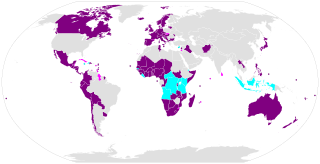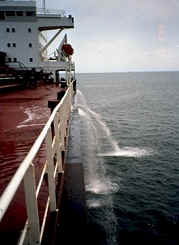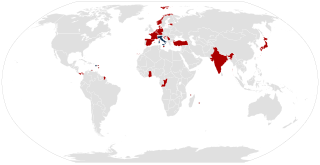
The Basel Convention on the Control of Transboundary Movements of Hazardous Wastes and Their Disposal, usually known as the Basel Convention, is an international treaty that was designed to reduce the movements of hazardous waste between nations, and specifically to prevent transfer of hazardous waste from developed to less developed countries (LDCs). It does not, however, address the movement of radioactive waste. The convention is also intended to minimize the rate and toxicity of wastes generated, to ensure their environmentally sound management as closely as possible to the source of generation, and to assist LDCs in environmentally sound management of the hazardous and other wastes they generate.

The European Convention on Human Rights is an international convention to protect human rights and political freedoms in Europe. Drafted in 1950 by the then newly formed Council of Europe, the convention entered into force on 3 September 1953. All Council of Europe member states are party to the Convention and new members are expected to ratify the convention at the earliest opportunity.

The International Maritime Organization is a specialised agency of the United Nations responsible for regulating shipping. The IMO was established following agreement at a UN conference held in Geneva in 1948 and the IMO came into existence ten years later, meeting for the first time in 1959. Headquartered in London, United Kingdom, IMO currently has 175 Member States and three Associate Members.
Arms control is a term for international restrictions upon the development, production, stockpiling, proliferation and usage of small arms, conventional weapons, and weapons of mass destruction. Arms control is typically exercised through the use of diplomacy which seeks to impose such limitations upon consenting participants through international treaties and agreements, although it may also comprise efforts by a nation or group of nations to enforce limitations upon a non-consenting country.

The International Convention for the Prevention of Pollution from Ships, 1973 as modified by the Protocol of 1978 is one of the most important international marine environmental conventions. It was developed by the International Maritime Organization with an objective to minimize pollution of the oceans and seas, including dumping, oil and air pollution.

The Convention on the Prevention of Marine Pollution by Dumping of Wastes and Other Matter 1972, commonly called the "London Convention" or "LC '72" and also abbreviated as Marine Dumping, is an agreement to control pollution of the sea by dumping and to encourage regional agreements supplementary to the Convention. It covers the deliberate disposal at sea of wastes or other matter from vessels, aircraft, and platforms. It does not cover discharges from land-based sources such as pipes and outfalls, wastes generated incidental to normal operation of vessels, or placement of materials for purposes other than mere disposal, providing such disposal is not contrary to aims of the Convention. It entered into force in 1975. As of September 2016, there were 89 Parties to the Convention.

Anti-fouling paint is a specialized category of coatings applied as the outer (outboard) layer to the hull of a ship or boat, to slow the growth of and facilitate detachment of subaquatic organisms that attach to the hull and can affect a vessel's performance and durability. It falls into a category of commercially available underwater hull paints, also known as bottom paints.
The International Convention for the Safety of Life at Sea (SOLAS) is an international maritime treaty that sets minimum safety standards in the construction, equipment and operation of merchant ships. The convention requires signatory flag states to ensure that ships flagged by them comply with at least these standards.
International Convention on Standards of Training, Certification and Watchkeeping for Seafarers (STCW), 1978 sets minimum qualification standards for masters, officers and watch personnel on seagoing merchant ships and large yachts. STCW was adopted in 1978 by conference at the International Maritime Organization (IMO) in London, and entered into force in 1984. The Convention was significantly amended in 1995 and 2010 enter into force on 1 January 2012.

The United Nations Convention on Certain Conventional Weapons, concluded at Geneva on October 10, 1980, and entered into force in December 1983, seeks to prohibit or restrict the use of certain conventional weapons which are considered excessively injurious or whose effects are indiscriminate. The full title is Convention on Prohibitions or Restrictions on the Use of Certain Conventional Weapons Which May Be Deemed to Be Excessively Injurious or to Have Indiscriminate Effects. The convention covers land mines, booby traps, incendiary devices, blinding laser weapons and clearance of explosive remnants of war.

In the United States, several federal agencies and laws have some jurisdiction over pollution from ships in U.S. waters. States and local government agencies also have responsibilities for ship-related pollution in some situations.

The Convention on Cluster Munitions (CCM) is an international treaty that prohibits all use, transfer, production, and stockpiling of cluster bombs, a type of explosive weapon which scatters submunitions ("bomblets") over an area. Additionally, the convention establishes a framework to support victim assistance, clearance of contaminated sites, risk reduction education, and stockpile destruction. The convention was adopted on 30 May 2008 in Dublin, and was opened for signature on 3 December 2008 in Oslo. It entered into force on 1 August 2010, six months after it was ratified by 30 states. As of February 2022, a total of 123 states are committed to the goal of the convention, with 110 states that have ratified it, and 13 states that have signed the convention but not yet ratified it.
The Convention for the Prevention of Marine Pollution by Dumping from Ships and Aircraft also called the Oslo Convention was an international agreement designed to control the dumping of harmful substances from ships and aircraft into the sea. It was adopted on 15 February 1972 in Oslo, Norway and came into force on 7 April 1974. Original signatories were Denmark, France, Iceland, Norway, Portugal, Spain, and Sweden. Later members included the United Kingdom (1975), the Netherlands (1975), Germany (1977), Finland (1979), Ireland (1982), and Belgium (1985).

Ballast water discharges by ships can have a negative impact on the marine environment. The discharge of ballast water and sediments by ships is governed globally under the Ballast Water Management Convention, since its entry into force in September 2017. It is also controlled through national regulations, which may be separate from the Convention, such as in the United States.

The Hong Kong International Convention for the safe and environmentally sound recycling of ships, or Hong Kong Convention is a mulitateral convention adopted in 2009, which has not entered into force. The conference that created the convention was attended by 63 countries, and overseen by the International Maritime Organization (IMO).

The Japan-Philippines Economic Partnership Agreement (日本・フィリピン経済連携協定) or in or commonly known as JPEPA is an economic partnership agreement concerning bilateral investment and free trade agreement between Japan and the Philippines. It was signed in Helsinki, Finland on September 9, 2006, by Japanese Prime Minister Junichiro Koizumi and Philippine President Gloria Macapagal Arroyo. It is the first bilateral trade treaty which the Philippines has entered since the Parity Right Agreement of 1946 with the United States. This treaty consists of 16 Chapters and 165 Articles, with 8 Annexes.
Emission Control Areas (ECAs), or Sulfur Emission Control Areas (SECAs), are sea areas in which stricter controls were established to minimize airborne emissions from ships as defined by Annex VI of the 1997 MARPOL Protocol.
The Convention on the Marking of Plastic Explosives for the Purpose of Detection is a multilateral anti-terrorism treaty that aims to prohibit and prevent the manufacture or storage of unmarked plastic explosives.
The Convention for the Suppression of Unlawful Acts against the Safety of Maritime Navigation or SUA Act is a multilateral treaty by which states agree to prohibit and punish behaviour which may threaten the safety of maritime navigation.

The International Convention for the Control and Management of Ships' Ballast Water and Sediments is a 2004 international maritime treaty which requires signatory flag states to ensure that ships flagged by them comply with standards and procedures for the management and control of ships' ballast water and sediments. The Convention aims to prevent the spread of harmful aquatic organisms from one region to another and halt damage to the marine environment from ballast water discharge, by minimising the uptake and subsequent discharge of sediments and organisms. From 2024, all ships are required to have approved Ballast Water Management Treatment System, according to the D2 standard. Existing ships are required to install an approved system, which may cost up to 5 million USD per ship to install. To assist with implementation, the IMO has released 14 Guidance documents in regards to the Convention including the G2 Guidelines for Ballast Water Sampling, G4 Guidelines for Ballast Water management and G6 Guidelines for Ballast Water Exchange. As of 15 July 2021, 86 countries were contracting States to the BWM Convention.











